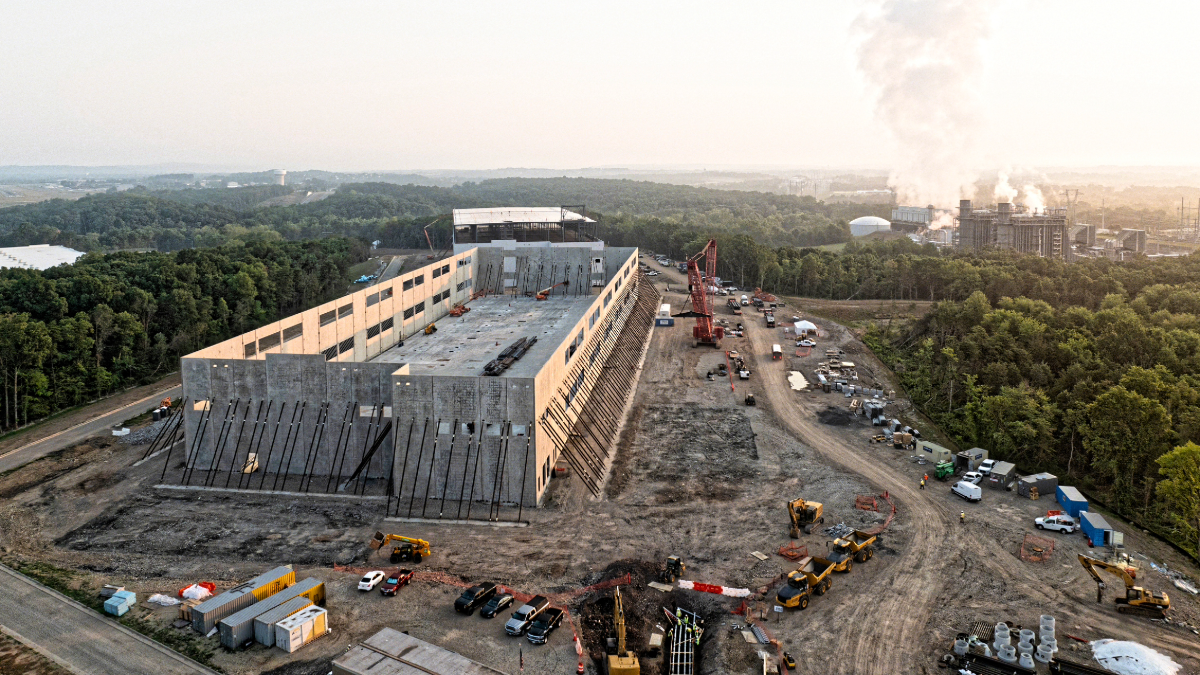Through 300+ Bills, US Lawmakers Juggle Data Center Priorities
Tim Bernard / Sep 12, 2025
Aerial view of data centers being built in Leesburg, VA. Credit: Gerville/2024
At last month’s National Conference of State Legislatures Legislative Summit, participants in a session entitled “AI and the Grid: A Love-Hate Relationship” discussed the pressures on energy generation and transmission that are emerging from the AI boom. While many states have introduced substantial incentives to bring in data centers, now that they are commencing operations, some of the problems they create have become clearer and legislators are reckoning with externalities like increased energy bills for other businesses and households.
In a Tech Policy Press review of over 300 proposed and passed bills related to data centers, while some unidirectional proposed legislation was evident, such as introducing or broadening tax incentives or proposing new regulations, the overall picture is of a balancing act as state legislatures engage with the tradeoffs between investment and jobs on one side and a host of problems for infrastructure, neighboring communities, and the environment on the other.
This is true when sets of bills are taken as a whole, but frequently also within particular bills, such as Arkansas’s HB1444 (enacted as Act 548), which expands a tax break to include smaller data centers and additional equipment categories while also introducing higher investment requirements for larger facilities to benefit even as it excludes crypto mining. Tightened eligibility criteria for tax exemptions and rebates in other bills include increasing requirements on the minimum number of jobs created, introducing electricity and water efficiency standards, and paying an electricity rate that entirely subsidizes any increase in costs to other customers that a data center creates. (As one example, all of these can be found in Michigan’s HB 4906, enacted as Public Act 207 of 2024, which also extends the deadline for the tax break in question.)
Partisan trends are evident amongst the bills, with Republican legislators generally more friendly to data centers and Democrats more likely to be concerned about their impact. However, this issue does not reach the level of polarization that dominates many contemporary political narratives in the US: over 60% of the 131 bills included in this review that increased incentives for data centers had at least one Democratic sponsor, and of the 160 bills that reduced incentives or attempted to deal with externalities directly, just over half had at least one Republican sponsor.
Regarding environmental problems resulting from data centers, carbon emissions and other pollutants may be front of mind for many readers of Tech Policy Press. Perhaps the most aggressive bill on that front was Minnesota’s HF 2928, which died in committee. It would have required data centers to go with 100% carbon-free sources of electricity by 2031. While this tends to be a partisan issue, other environmental concerns, such as water availability, damage to parks, and noise are on the radar for lawmakers on both sides of the aisle: one third of bills that contained measures intended to protect the environment had at least one Republican sponsor.
Costs related to electrical infrastructure is another area of bipartisan concern: 59 bills included in the review attempted to mitigate aspects of this problem area, over 60% of which had at least one Republican sponsor. Data centers can place extreme burdens on the grid, overwhelming current capacities, requiring upgrades and increased generation sources, and resulting in other customers facing steeply rising electricity bills. In response, lawmakers have proposed, amongst other measures, imposing data center energy efficiency requirements for tax breaks; requiring sufficient electric capacity to be confirmed before data center approval; directing utilities to create a special tariff for data centers to recoup all relevant costs that they cause; and even one bill encouraging the rehabilitation of an abandoned incomplete nuclear power plant.
Another key theme, present in 55 of these bills, is the establishment of working groups and commissions and directing (or requesting) state agencies or universities to study data center impacts on the economy, energy supply and grid, water resources. One good example of these bills is Montana’s HJ 46, which died in committee, and includes a mandate to explore approaches to cost mitigation if a data center plan falls through. In addition, some proposed laws require data centers and utilities to report how much electricity and / or water data centers are using in order to create a knowledge base for policy planning, such as Oregon’s HB3698, currently in committee, which demands water and electricity usage information.
The lack of transparency regarding the impact of data centers has been highlighted in this publication and elsewhere, with tech companies allegedly guilty of greenwashing and data center developers sometimes imposing non-disclosure agreements on local governments, creating obstacles to civil society and public policy responses. Where new laws create a body of reliable data for policymakers and for the public (Oregon’s bill referenced above would have required publication of the collected data on a public website), they have the potential to make real inroads into this problem.
Caught between competing demands, many policymakers appear to be wary of backing black-and-white solutions. A trend of policymakers recognizing tradeoffs, embracing expert research, and rejecting blunt tools is heartening; the question is how much damage will be done before they find an acceptable balance, and how much industry promises and influence will tip the scales.
This review was conducted in August 2025, and is a snapshot of proposed and passed legislation from the US Congress and State legislatures introduced during the 2025 session and the immediately preceding session.
Explanation of tags
Fee: Imposes a direct charge on data centers
Environment: Appears to be motivated by a desire to limit CO2 emissions, protect water supplies or public lands, or prevent noise nuisance
Incentive+: Creates or expands an incentive for data centers to be established, often but not always through a tax rebate or exemption, or a special low tax rate.
Incentive-: Limits, removes, or tightens the eligibility criteria for an existing incentive.
Regulation: Directly imposes rules or regulator oversight for data centers, or introduces new or stricter data center approvals processes.
Study / data collection: Initiates a study into how to best handle data centers, typically into managing tradeoffs with externalities and sometimes into incentivising their establishment, or directs the collection of data about the facilities impact.
Foreign: Tackles security concerns about data centers in other countries, especially those in adversary nations. (Many of these are aimed at shutting down disingenuous veterans’ benefits consultants.)
Capacity: Attempts to mitigate data centers’ high electricity load, for example by supporting improvements to grid infrastructure or increasing power generation.
Capital investment: Relating to how the government spends money on establishing, improving, or migrating its own data storage.
Protect crypto: Prevents crypto mining facilities being singled out for local regulation above other data centers (identical and near-identical bills).
Authors
